Module 5 Lao She Teahouse. Unit 1 I wanted to see the Beijing Opera课件32张PPT
文档属性
| 名称 | Module 5 Lao She Teahouse. Unit 1 I wanted to see the Beijing Opera课件32张PPT |
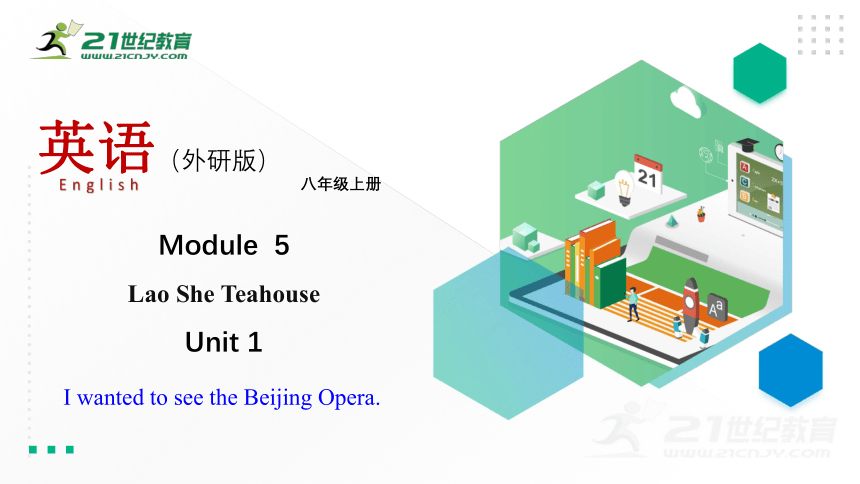
|
|
| 格式 | pptx | ||
| 文件大小 | 23.7MB | ||
| 资源类型 | 试卷 | ||
| 版本资源 | 外研版 | ||
| 科目 | 英语 | ||
| 更新时间 | 2021-08-15 06:58:48 | ||
图片预览

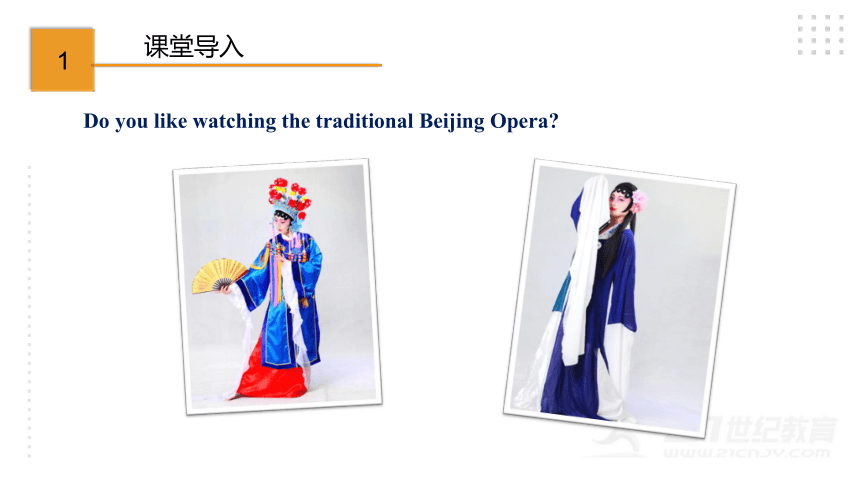


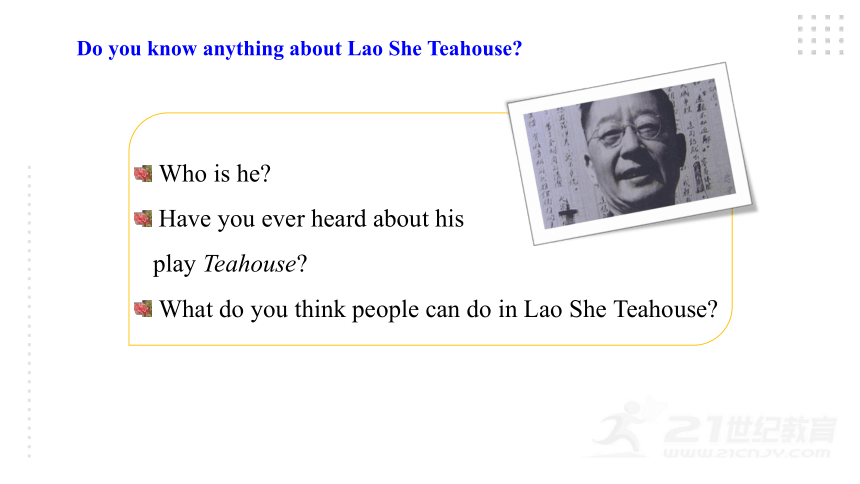
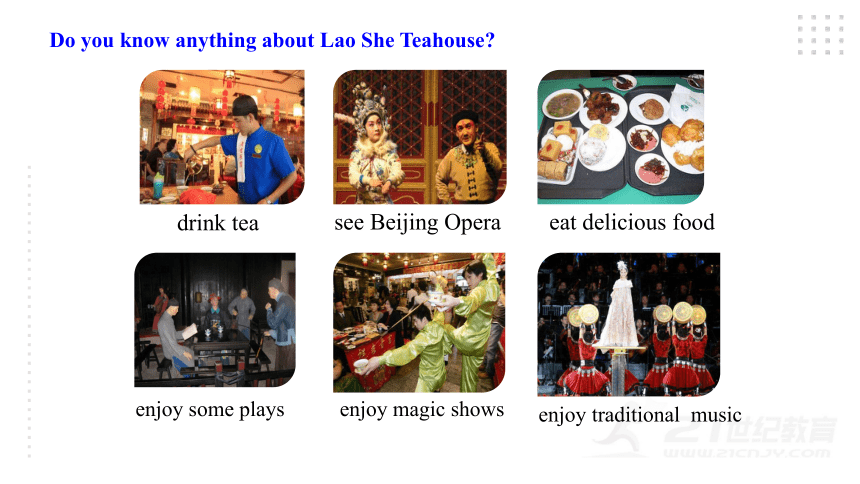

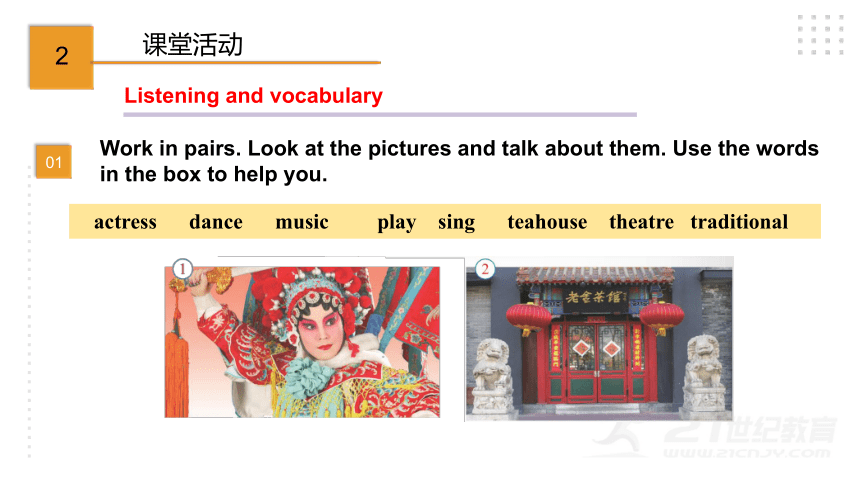
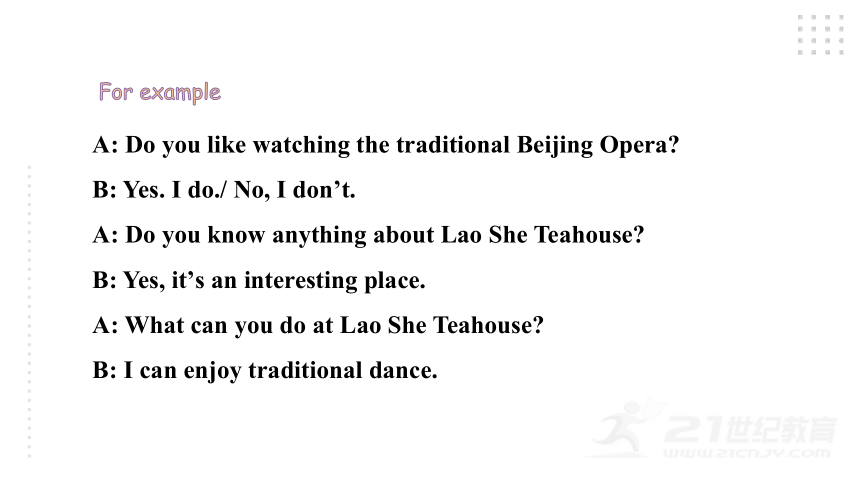
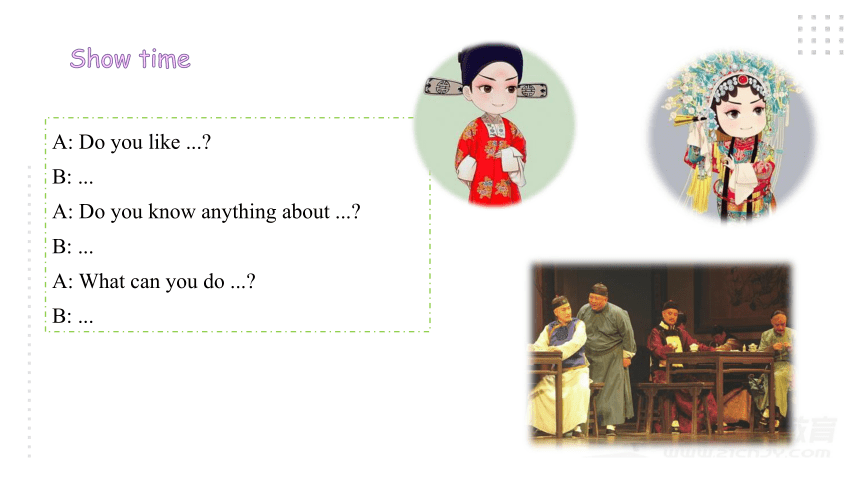
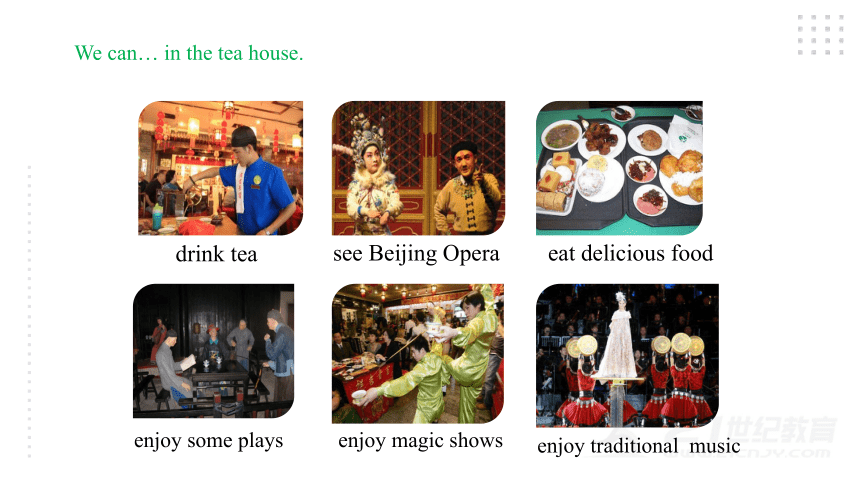

文档简介
英语(外研版)
八年级上册
English
Module 5
Lao She Teahouse
Unit 1
I wanted to see the Beijing Opera.
Do you like watching the traditional Beijing Opera?
1
课堂导入
Enjoy some pictures
the Beijing Opera
actress
actor
Have you ever been here?
Free talking
Who is he?
Have you ever heard about his
play Teahouse?
What do you think people can do in Lao She Teahouse?
Do you know anything about Lao She Teahouse?
enjoy some plays
drink tea
see Beijing Opera
eat delicious food
enjoy magic shows
enjoy traditional music
Do you know anything about Lao She Teahouse?
actress
teahouse
offer
end
in the end
no idea
n. 女演员
n. (尤指亚洲)的茶馆
v. 提议;提出
n. (时间的)最后一段、末尾 v. 结束
最后;终于
不知道
Words and expressions
Listening and vocabulary
Work in pairs. Look at the pictures and talk about them. Use the words in the box to help you.
actress dance music play sing teahouse theatre traditional
01
2
课堂活动
A: Do you like watching the traditional Beijing Opera?
B: Yes. I do./ No, I don’t.
A: Do you know anything about Lao She Teahouse?
B: Yes, it’s an interesting place.
A: What can you do at Lao She Teahouse?
B: I can enjoy traditional dance.
For example
Show time
A: Do you like ...?
B: ...
A: Do you know anything about ...?
B: ...
A: What can you do ...?
B: ...
enjoy some plays
drink tea
see Beijing Opera
eat delicious food
enjoy magic shows
enjoy traditional music
We can… in the tea house.
Listen and underline the correct words or expressions.
1 Betty often sees/ wants to see the traditional Beijing Opera.
2 Betty knows/ doesn’t know Lao She Teahouse.
3 Lingling says that the opera is easy/ difficult to understand.
02
Lingling: Hi, Betty.
Betty: Hi, Lingling. l’d like to see the traditional Beijing Opera.
Lingling: Do you want to come to Lao She Teahouse with me?
Betty: What’s Lao She Teahouse?
Tapescript:
Lingling: You can listen to the Beijing Opera there and drink tea at the same time.
Betty: Yes, please. l’d like to go with you. You can tell me what’s happening.
Lingling: Yes, it’s quite difficult to understand the story! Just watch the actors and
actresses, listen to the music and try to enjoy it.
Betty: Lingling and I went to Lao She Teahouse last night.
Tony: How was it?
Betty: It was great! You know, I wanted to see the Beijing Opera, so Lingling offered
to take me there. We drank tea and watched an opera.
Tony: Did you understand the opera?
Betty: No, it was difficult to understand the words. But the actors and actresses
were excellent.
Tony: How long did you stay?
Betty: We only planned to watch for an hour, but in the end, we stayed for three hours.
Tony: Did you enjoy it?
Betty: Well, it was interesting – that’s the main thing. I hope to understand more next time.
Listen and read.
03
Tony: Do you often go to see the Beijing Opera, Lingling?
Lingling: No, I don’t. I wanted to take Betty to the teahouse
because it’s famous.
Tony: Who is Lao She?
Betty: No idea. Ask Lingling.
Lingling: Lao She is a great writer.
He’s especially famous for his play Teahouse.
1.?Why?did?Lingling?take?Betty?to the?teahouse?
Because?Betty wanted to?see the?Beijing?Opera.
2.?What?did?Betty?and?Lingling do?at?the?teahouse?
They?drank?tea?and?watched?an?opera.
Read and answers.
Now check (√) the true sentences.
Tony went to Lao She Teahouse with Betty and Lingling.
Betty understood the opera.
Lingling and Betty stayed longer than they planned.
Betty enjoyed the opera.
√
√
×
×
5. Betty would like to see the Beijing Opera again.
6. Betty knew about Lao She before she went to the house.
√
×
would like to do sth.想做某事
单击此处编辑母版文本样式
二级
三级
四级
五级
Complete the passage with the correct form of the words in the box.
Betty wanted to see the Beijing Opera. So Lingling (1) ________to take Betty to Lao She Teahouse. The words of the opera were (2) _________ to understand, but the actors and (3) _________ were excellent. They only planned to watch for an hour, but in the (4) ____, they stayed for three hours. Betty thought it was interesting-that was the (5) ______ thing!
offered
difficult
actresses
end
main
04
1. 辨析in the end,at last和finially。
▲in the end:表示经过多种变化,困难和捉摸不定的情况才发生某 事。
▲at last:往往表示经过一番努力和曲折的过程,带有浓厚的感彩。
▲finially: 表示一系列事物的顺序,没有感彩。
2. 辨析be famous for,be famous as和be famous to。
●be famous for意为“因.......而闻名”,后接著名的原因。
●be famous as意为“作为.......而闻名”,后接表示身份/职业的词。
●be famous to 意为“为.......熟知”,后接人。
Language points
① offer sb. sth. = offer sth. to sb.
给某人提供某物
例句:这位老人给我提供了一个不错的房间。
The old man offered me a nice room.
3. ... so Lingling offered to take me there.
② offer to do sth. 提出要做某事
例句:她提出要买一台彩电。
She offered to buy a colour TV.
当我们要表示“想做某事、需要做某事或决定做某事”时,我们就会使用动词不定式形式,动词不定式是由“to+动词原形”构成 (有时可以不带to)。其否定形式是“not+动词不定式”(not不与助动词连用)。动词不定式位于动词之后作宾语,表示想要、计划或希望要做(或发生)的事。
4.动词不定式做宾语
1. 我想明天去打篮球。
2. 昨天我主动提出帮妈妈做家务。
3. 我打算明天做作业。
4. 我们希望这个周末回家。
I want to play basketball tomorrow.
I offered to help mother do housework.
I plan to do homework tomorrow.
We hope to go home this weekend.
英语语句中的重读规则即对所强调的信息进行重读。在含有动词不定式的语句中,动词和名词往往重读,介词、连词、助动词弱读。
Pronunciation and speaking
Now listen and check.
Read and predict which words in the answers the speaker is likely to stress.
– Do you want to see the Beijing Opera?
– Yes, I’d love to.
2. – Do you want to come to Lao She
Teahouse with me?
– Yes, I’d like to go with you.
05
Work in pairs. Read the conversations in Activity 5 aloud.
1 — Do you want to see the Beijing Opera?
— Yes, I’d love to.
2 — Do you want to come to Lao She Teahouse with me?
— Yes, please. I’d like to go with you.
06
Complete the sentences.
I want to ______________________________ next week.
2. They offered to ____________.
3. I hope to __________________.
4. My parents agree to ____________ on Saturday.
go to watch a movie at the cinema
have a picnic
be a singer one day
go for a walk
07
Work in pairs. Talk about something you’d like to do or see.
-I want to go to Xinjiang and ride horses.
- …
Sample:
— I want to go to west lake and take some pictures.
— That sounds good. Who do you want to go with?
— My friend Ann wants to go with me.
08
3
课堂小结
1. We have understood the conversation about Lao She Teahouse.
2. We have talked about intentions and plans.
A.翻译下列句子。
1. 托尼(Tony)今天晚上想去看足球赛。(would like)
2. 妈妈昨天答应给我买一台电脑。(agree)
3. 大明今天主动提出帮助我学英语。(offer)
4. 你想和我一起去游泳吗?(want)
Tony would like to watch a football match this evening.
My mother agreed to buy a computer for me yesterday.
Daming offered to help me with my English today.
Do you want to go swimming with me?
4
课堂训练
B. 用所给词的适当形式填空。
1. She asked me ______ (wait) for her at the cinema.
2. I enjoy ________ (listen) to the radio in the evening.
3. It is not easy _______ (learn) a foreign language.
4. He agreed _____ (get) someone to help us.
5. I told him _________ (not play) in the street.
6. Would you like ______ (come) with me?
7. Your task is ______ (find) the cost of the hotel.
8. Should I ___ (go) home now?
9. I’m glad _____ (see) you again.
10. He needs ______ (buy) a new bike.
to wait
listening
to learn
to get
not to play
to come
to find
go
to see
to buy
1. Did you have a good time last Sunday? (改为同义句)
Did you ______ _______ last Sunday?
2. Lao She wrote Teahouse. He became famous. (合并为一句)
Lao She _______ _______ ___ writing Teahouse.
3. It is possible for us to finish the work in three hours.(改为否定句)
It __ __________ for us to finish the work in three hours.
4. Tourists need to wear warm clothes in winter.(改为否定句)
Tourists _____ ____ to wear warm clothes in winter.
C. 句型转换。
enjoy yourself
became famous for
is impossible
don’t need
https://www.21cnjy.com/help/help_extract.php
八年级上册
English
Module 5
Lao She Teahouse
Unit 1
I wanted to see the Beijing Opera.
Do you like watching the traditional Beijing Opera?
1
课堂导入
Enjoy some pictures
the Beijing Opera
actress
actor
Have you ever been here?
Free talking
Who is he?
Have you ever heard about his
play Teahouse?
What do you think people can do in Lao She Teahouse?
Do you know anything about Lao She Teahouse?
enjoy some plays
drink tea
see Beijing Opera
eat delicious food
enjoy magic shows
enjoy traditional music
Do you know anything about Lao She Teahouse?
actress
teahouse
offer
end
in the end
no idea
n. 女演员
n. (尤指亚洲)的茶馆
v. 提议;提出
n. (时间的)最后一段、末尾 v. 结束
最后;终于
不知道
Words and expressions
Listening and vocabulary
Work in pairs. Look at the pictures and talk about them. Use the words in the box to help you.
actress dance music play sing teahouse theatre traditional
01
2
课堂活动
A: Do you like watching the traditional Beijing Opera?
B: Yes. I do./ No, I don’t.
A: Do you know anything about Lao She Teahouse?
B: Yes, it’s an interesting place.
A: What can you do at Lao She Teahouse?
B: I can enjoy traditional dance.
For example
Show time
A: Do you like ...?
B: ...
A: Do you know anything about ...?
B: ...
A: What can you do ...?
B: ...
enjoy some plays
drink tea
see Beijing Opera
eat delicious food
enjoy magic shows
enjoy traditional music
We can… in the tea house.
Listen and underline the correct words or expressions.
1 Betty often sees/ wants to see the traditional Beijing Opera.
2 Betty knows/ doesn’t know Lao She Teahouse.
3 Lingling says that the opera is easy/ difficult to understand.
02
Lingling: Hi, Betty.
Betty: Hi, Lingling. l’d like to see the traditional Beijing Opera.
Lingling: Do you want to come to Lao She Teahouse with me?
Betty: What’s Lao She Teahouse?
Tapescript:
Lingling: You can listen to the Beijing Opera there and drink tea at the same time.
Betty: Yes, please. l’d like to go with you. You can tell me what’s happening.
Lingling: Yes, it’s quite difficult to understand the story! Just watch the actors and
actresses, listen to the music and try to enjoy it.
Betty: Lingling and I went to Lao She Teahouse last night.
Tony: How was it?
Betty: It was great! You know, I wanted to see the Beijing Opera, so Lingling offered
to take me there. We drank tea and watched an opera.
Tony: Did you understand the opera?
Betty: No, it was difficult to understand the words. But the actors and actresses
were excellent.
Tony: How long did you stay?
Betty: We only planned to watch for an hour, but in the end, we stayed for three hours.
Tony: Did you enjoy it?
Betty: Well, it was interesting – that’s the main thing. I hope to understand more next time.
Listen and read.
03
Tony: Do you often go to see the Beijing Opera, Lingling?
Lingling: No, I don’t. I wanted to take Betty to the teahouse
because it’s famous.
Tony: Who is Lao She?
Betty: No idea. Ask Lingling.
Lingling: Lao She is a great writer.
He’s especially famous for his play Teahouse.
1.?Why?did?Lingling?take?Betty?to the?teahouse?
Because?Betty wanted to?see the?Beijing?Opera.
2.?What?did?Betty?and?Lingling do?at?the?teahouse?
They?drank?tea?and?watched?an?opera.
Read and answers.
Now check (√) the true sentences.
Tony went to Lao She Teahouse with Betty and Lingling.
Betty understood the opera.
Lingling and Betty stayed longer than they planned.
Betty enjoyed the opera.
√
√
×
×
5. Betty would like to see the Beijing Opera again.
6. Betty knew about Lao She before she went to the house.
√
×
would like to do sth.想做某事
单击此处编辑母版文本样式
二级
三级
四级
五级
Complete the passage with the correct form of the words in the box.
Betty wanted to see the Beijing Opera. So Lingling (1) ________to take Betty to Lao She Teahouse. The words of the opera were (2) _________ to understand, but the actors and (3) _________ were excellent. They only planned to watch for an hour, but in the (4) ____, they stayed for three hours. Betty thought it was interesting-that was the (5) ______ thing!
offered
difficult
actresses
end
main
04
1. 辨析in the end,at last和finially。
▲in the end:表示经过多种变化,困难和捉摸不定的情况才发生某 事。
▲at last:往往表示经过一番努力和曲折的过程,带有浓厚的感彩。
▲finially: 表示一系列事物的顺序,没有感彩。
2. 辨析be famous for,be famous as和be famous to。
●be famous for意为“因.......而闻名”,后接著名的原因。
●be famous as意为“作为.......而闻名”,后接表示身份/职业的词。
●be famous to 意为“为.......熟知”,后接人。
Language points
① offer sb. sth. = offer sth. to sb.
给某人提供某物
例句:这位老人给我提供了一个不错的房间。
The old man offered me a nice room.
3. ... so Lingling offered to take me there.
② offer to do sth. 提出要做某事
例句:她提出要买一台彩电。
She offered to buy a colour TV.
当我们要表示“想做某事、需要做某事或决定做某事”时,我们就会使用动词不定式形式,动词不定式是由“to+动词原形”构成 (有时可以不带to)。其否定形式是“not+动词不定式”(not不与助动词连用)。动词不定式位于动词之后作宾语,表示想要、计划或希望要做(或发生)的事。
4.动词不定式做宾语
1. 我想明天去打篮球。
2. 昨天我主动提出帮妈妈做家务。
3. 我打算明天做作业。
4. 我们希望这个周末回家。
I want to play basketball tomorrow.
I offered to help mother do housework.
I plan to do homework tomorrow.
We hope to go home this weekend.
英语语句中的重读规则即对所强调的信息进行重读。在含有动词不定式的语句中,动词和名词往往重读,介词、连词、助动词弱读。
Pronunciation and speaking
Now listen and check.
Read and predict which words in the answers the speaker is likely to stress.
– Do you want to see the Beijing Opera?
– Yes, I’d love to.
2. – Do you want to come to Lao She
Teahouse with me?
– Yes, I’d like to go with you.
05
Work in pairs. Read the conversations in Activity 5 aloud.
1 — Do you want to see the Beijing Opera?
— Yes, I’d love to.
2 — Do you want to come to Lao She Teahouse with me?
— Yes, please. I’d like to go with you.
06
Complete the sentences.
I want to ______________________________ next week.
2. They offered to ____________.
3. I hope to __________________.
4. My parents agree to ____________ on Saturday.
go to watch a movie at the cinema
have a picnic
be a singer one day
go for a walk
07
Work in pairs. Talk about something you’d like to do or see.
-I want to go to Xinjiang and ride horses.
- …
Sample:
— I want to go to west lake and take some pictures.
— That sounds good. Who do you want to go with?
— My friend Ann wants to go with me.
08
3
课堂小结
1. We have understood the conversation about Lao She Teahouse.
2. We have talked about intentions and plans.
A.翻译下列句子。
1. 托尼(Tony)今天晚上想去看足球赛。(would like)
2. 妈妈昨天答应给我买一台电脑。(agree)
3. 大明今天主动提出帮助我学英语。(offer)
4. 你想和我一起去游泳吗?(want)
Tony would like to watch a football match this evening.
My mother agreed to buy a computer for me yesterday.
Daming offered to help me with my English today.
Do you want to go swimming with me?
4
课堂训练
B. 用所给词的适当形式填空。
1. She asked me ______ (wait) for her at the cinema.
2. I enjoy ________ (listen) to the radio in the evening.
3. It is not easy _______ (learn) a foreign language.
4. He agreed _____ (get) someone to help us.
5. I told him _________ (not play) in the street.
6. Would you like ______ (come) with me?
7. Your task is ______ (find) the cost of the hotel.
8. Should I ___ (go) home now?
9. I’m glad _____ (see) you again.
10. He needs ______ (buy) a new bike.
to wait
listening
to learn
to get
not to play
to come
to find
go
to see
to buy
1. Did you have a good time last Sunday? (改为同义句)
Did you ______ _______ last Sunday?
2. Lao She wrote Teahouse. He became famous. (合并为一句)
Lao She _______ _______ ___ writing Teahouse.
3. It is possible for us to finish the work in three hours.(改为否定句)
It __ __________ for us to finish the work in three hours.
4. Tourists need to wear warm clothes in winter.(改为否定句)
Tourists _____ ____ to wear warm clothes in winter.
C. 句型转换。
enjoy yourself
became famous for
is impossible
don’t need
https://www.21cnjy.com/help/help_extract.php
同课章节目录
- Module 1 How to learn English
- Unit 1 Let's try to speak English as much as possi
- Unit 2 You should smile at her.
- Unit 3 Language in use .
- Module 2 My home town and my country
- Unit 1 It's taller than many other buildings.
- Unit 2 Cambridge is a beautiful city in the east o
- Unit 3 Language in use .
- Module 3 Sports.
- Unit 1 Nothing is more exciting than playing tenni
- Unit 2 This year we training more carefully.
- Unit 3 Language in use .
- Module 4 Planes, ships and trains .
- Unit 1 He lives the farthest from school.
- Unit 2 What is the best way to travel.
- Unit 3 Language in use .
- Module 5 Lao She Teahouse.
- Unit 1 I wanted to see the Beijing Opera.
- Unit 2 It descibes the changes in Chinese society.
- Unit 3 Language in use .
- Module 6 Animals in danger.
- Unit 1 It allows people to get closer to them .
- Unit 2 The WWF is working hard to save them all.
- Unit 3 Language in use .
- Revision module A
- Module 7 A famous story
- Unit 1 Alice was sitting with her sister by the ri
- Unit 2 She was thinking about her cat.
- Unit 3 Language in use .
- Module 8 Accidents
- Unit 1 While the car were changing to red, a car s
- Unit 2 I was trying to pick it up when it bite me
- Unit 3 Language in use .
- Module 9 Population
- Unit 1 The population of China is about 1.37 billi
- Unit 2 Arnwick was a city with 200,000 people.
- Unit 3 Language in use .
- Module 10 The weathe
- Unit 1 It might snow.
- Unit 2 The weather is fine all year round.
- Unit 3 Language in use .
- Module 11 Way of life
- Unit 1 In China ,we open a gift later.
- Unit 2 In England, you usually drink tea with milk
- Unit 3 Language in use .
- Module 12 Help
- Unit 1 What should we do before help arrives?
- Unit 2 Stay away from windows and heavy furniture.
- Unit 3 Language in use .
- Revision module B
